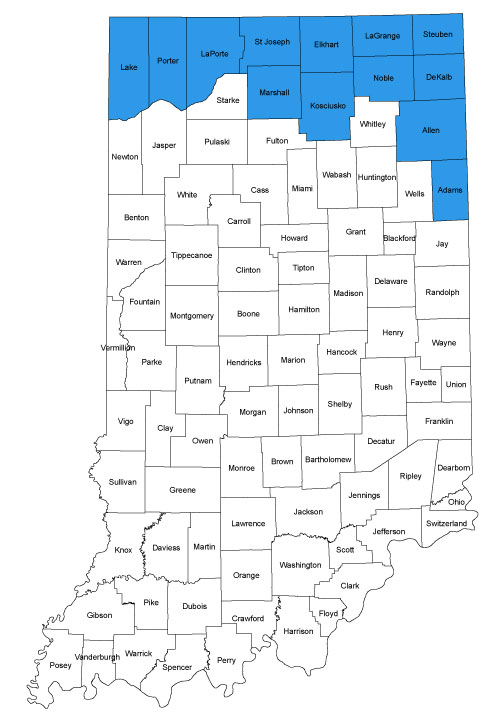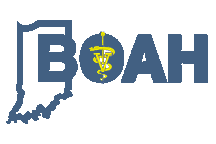EEE Testing Reimbursement for Equine in Northern Indiana
Veterinarians may receive reimbursement for testing equine for Eastern equine encephalitis (EEE). The Indiana State Board of Animal Health (BOAH) and Indiana Department of Health (IDOH) are conducting an Indiana EEE Survey of equine in targeted northern Indiana counties. For a limited time, funds are available to veterinarians for testing unvaccinated equine exhibiting signs of EEE.
To qualify, equine must meet all three of the following criteria:
Animal must reside in one of the following Northern Indiana counties: Lake, Porter, LaPorte, St. Joseph, Marshall, Kosciusko, Elkhart, LaGrange, Noble, Steuben, DeKalb, Allen, or Adams.
Animal must be unvaccinated or overdue on vaccination for EEE.
Animal must be exhibiting neurological clinical signs consistent with EEE, such as: listlessness, high fever, head pressing, or seizures.

Testing and Sample Submission
Veterinarians must receive preauthorization from BOAH for each sample submission. Samples must be submitted to the National Veterinary Service Laboratory (NVSL) in Ames, Iowa. Veterinarians will need to create an account with NVSL and obtain a submitter ID by calling NVSL at: (515) 337-7514
Steps for testing and sample submission:
Verify the equine meets all criteria listed above.
Hold the specimen until you have received authorization for reimbursement. Collect either:
- 2 ml blood serum sample for the ELISA, OR
- 1 ml cerebral spinal fluid for PCR.
- Contact Dr. Heather Solomon-Gabl at BOAH for authorization.
Phone: 317-495-8249
Email: hsolomon@boah.in.gov
If approved, Dr. Solomon will provide an authorization number for each sample on the submission form.
Complete NVSL VS FORM 10-4
Box 9 enter, as appropriate, either: IgM ELISA for EEE OR PCR for EEE.
Box 22 enter: Indiana EEE Survey and the authorization number from BOAH
Ship sample to:
National Veterinary Services Laboratories
Attn: Sample Processing Department
1920 Dayton Avenue
Ames, IA 50010
All test results will be reported to the submitting practitioners as well as BOAH. This survey is designed to be a surveillance tool to assist public health in responding to the presence of the virus in the environment.
Reimbursement
The participating practice or practitioner should submit required state of Indiana paperwork prior to submitting samples to ensure prompt payment. To qualify, the veterinarian must be licensed in Indiana and USDA-accredited. Veterinarians will be reimbursed by the State of Indiana a flat rate of $75 per sample submitted to NVSL. Payments may be issued to a veterinarian or a veterinary clinic.
Steps to be reimbursed (must be completed only once, not for each sample):
Complete the State of Indiana Automated Direct Deposit form
Complete the W-9 form
Email completed forms to Sara Darrah at the Indiana State Board of Animal health at: SarDarrah@boah.IN.gov
Create an invoice for BOAH that includes each sample with the amount of $75 for each sample. Invoices may be emailed or mailed to BOAH.
Email: SarDarrah@boah.IN.gov Mail: Indiana State Board of Animal Health ATTN: Sara Darrah 1202 E 38th Street, Discovery Hall, Suite 100 Indianapolis, IN 46205
NOTE: Funds are limited. Testing will be reimbursed on a case-by-case basis and is dependent upon available funds. Veterinarians should only request reimbursement for testing of equines with illness strongly compatible with EEE.
EEE in Indiana
In 2020, EEE infection was detected in four horses in LaGrange, Kosciusko and LaPorte counties. One human case of EEE occurred in a LaPorte County resident in 2020.
In 2019, EEE infection was detected in 14 horses in Elkhart and LaGrange counties. The infected horses were either not vaccinated or overdue on vaccination. One fatal human case of EEE occurred in Elkhart County in 2019, and 10 human cases occurred in southern Michigan, 6 of which were fatal.
BOAH encourages practitioners to explain the importance of vaccination for mosquito-borne illnesses to clients.
EEE is often called "sleeping sickness" because it causes infected animals to enter a coma. Other clinical signs may include listlessness, high fever, head pressing and seizures. Horses that develop it rarely survive. The EEE virus is maintained in the bird population and is transmitted by mosquitoes that breed in freshwater wetlands. EEE can infect people and, like the more common West Nile virus, cannot be directly transmitted from infected horses to other horses or humans.
(Updated: October, 2024)
